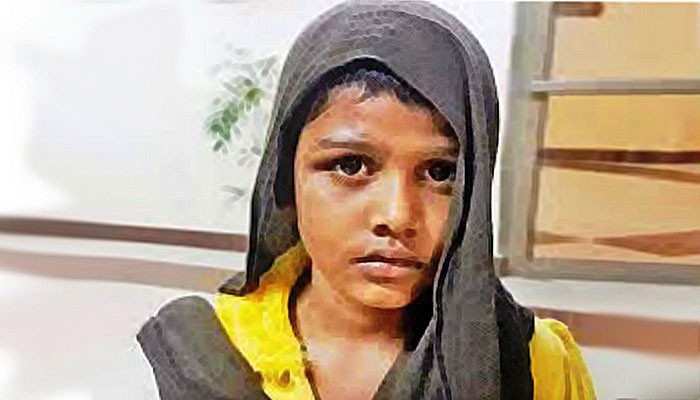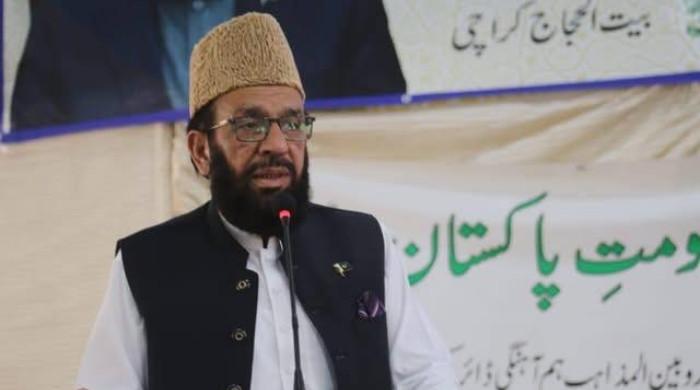IHC increases sentence of judge, wife to three years in Tayyaba torture case
Judge Raja Khurram Ali Khan and his wife Maheen will now serve three-year jail term
June 11, 2018
ISLAMABAD: The Islamabad High Court (IHC) increased on Monday the sentence of a suspended judge and his wife in a case related to torturing of a child maid, taking their total jail term to three years.
The decision came after Chief Justice of Pakistan Justice Mian Saqib Nisar ordered the IHC on June 4 to decide on the appeals filed by suspended Additional District and Sessions Judge Raja Khurram Ali Khan and his wife Maheen Zafar — who had challenged their one-year prison sentences and fines imposed on them by the high court after being convicted of torturing their juvenile maid Tayyaba.
A division bench, comprising Justice Athar Minallah and Justice Miangul Hassan Aurangzeb, dismissed the appeals of the suspended judge and his wife, and increased their sentences to three years each. The court also imposed a fine of Rs0.5 million on the convicts.
The bench issued a 46-page judgment on the case.
"Keeping in view the above principles and law and the facts and circumstances of the instant case, we are satisfied that there is no mitigating factor which would call for handing down the lesser sentence. The appellants are not worthy of any sympathy because the ill treatment and neglect was willful and cannot be justified on any ground whatsoever. They were aware and they deliberately and consciously made an innocent and helpless child to suffer tremendously," the judgment read.
It added, "While parting we cannot restrain ourselves from recording our observations regarding the failure of the criminal justice system in protecting the most weak and vulnerable members of the society."
The bench in its 46-page judgment further said that the in-charge of the concerned police station, namely Khalid Mehmood Awan, did not " fulfill his obligations by putting the legal process into motion" after he received information regarding Tayyaba's plight.
"The Inspector General of Police, Islamabad Capital Territory is, therefore, expected to probe the role of Khalid Mehmood Awan, PW16, particularly regarding the making of the video placed on record as Ex DA. The Inspector General is also expected to take urgent and appropriate measures to ensure that professional officers, specially trained to deal with victims who are children, are entrusted with cases relating to them," it said.
The judgment further upheld, "If rule of law is to prevail and the criminal justice system is to be made responsive to the weak and against alleged offences committed by the stronger and privileged segments of the society then even the slightest dereliction of duty by officials inevitably has to be dealt with sternly."
On June 16, IHC's Justice Aamer Farooq ruled that suspended judge Raja Khurram Ali Khan and his wife Maheen Zafar would serve a year each in prison for torturing the child maid under Section 328-A (cruelty to a child).
The two were also fined Rs50,000 each for the crime of employing an underage (below 12 years of age) child. However, the judge and his wife had received bail immediately after the verdict was announced.
Later on April 23, a two-member bench of IHC, comprising justices Azharmanullah and Miangul Hassan Aurangzeb, suspended their sentences.
On December 29, 2016, Tayyaba, a 10-year-old domestic help, was recovered from the house of the judge after receiving complaints of torture from neighbours. The issue sparked outrage on social media and led to calls for strict and swift justice.
Subsequently, a first information report (FIR) was filed against the judge and his wife at the I-9 police station.
An inquiry report by the police found that the judge's wife was responsible for torturing the child maid, and held Khurram responsible of indirect criminal negligence.
Later, on January 3, 2017, Tayyaba's parents reached a compromise and forgave the accused.
However, Chief Justice of Pakistan Justice Mian Saqib Nisar took a suo motu notice of the compromise agreement and ordered the IHC to conduct a trial of the case.
Following the incident, the IHC suspended the judge and made him an officer on special duty.
In total, the statements of 19 witnesses were recorded in the case, wherein 11 were from civil servants and eight from private witnesses, including Tayyaba's parents.














